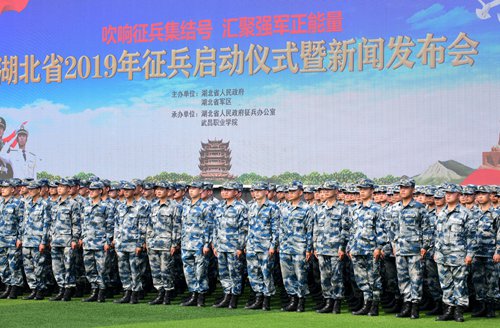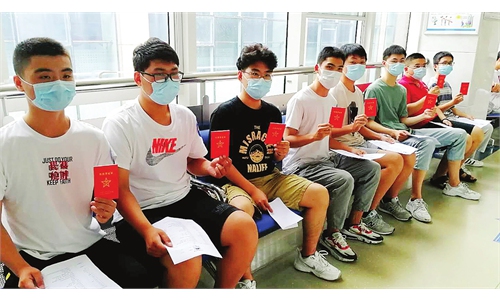Chinese military launches non-commissioned officer recruitment program among gaokao sitters

The news conference for recruitment at Wuchang Polytechnic College, Central China's Hubei Province. Photo: VCG
China is recruiting non-commissioned officers (NCOs) for specific purposes among 2022 national college entrance examinations (or gaokao) sitters for the first time since the nation launched the NCO program, underscoring the country's efforts to boost the quality of its troops and improve the employment of graduates at the same time.
According to China Central Television (CCTV), 2022 gaokao sitters can apply for a three-year program at relevant universities and colleges, and those qualified would be recruited as NCOs.
Applicants should be under 20 years old and single, and they should meet the requirements for political and physical conditions in line with the rules for military enlistees.
Universities and colleges will be responsible for the first two and a half years of academic instruction. In the final half year, the military will take over their instruction as cadets. The schools will handle the final graduation procedures.
Afterward, program participants will get military ranks as NCOs, effective from September 1 of their graduation year.
From the day the specially trained NCOs enter service until they are given ranks for the first time, they will enjoy the same benefits as first-year conscripts like subsidies, fares, medical support and insurance. After becoming NCOs, they will get the salary and benefits for such positions, per the CCTV report.
Applications can be made for six majors at six schools, depending on applicants' gender, according to CCTV. The report did not announce what the six majors are.
Training NCOs will effectively boost the quality of the troops, a Chinese military expert and veteran who works with recruitment told the Global Times on Tuesday, requesting anonymity.
It is an alternative for studying at a military academy and becoming an officer, the expert said.
When cadets graduate, they are ready for their posts almost instantaneously and can keep doing their jobs there like a career, unlike compulsory service that lasts only two years, the expert said.
At a time when technology is becoming increasingly important in the military, it has become important to keep such people in the military for longer periods, the expert said.
This milestone also comes as attention increasingly focuses on the employment pressure for new graduates.
Joining the military through the program will provide many young students with stable jobs, and prepare them for future careers in highly competitive sectors such as the civil service or state-owned-enterprises, observers said.
A Sina Weibo user going by the name of Xuanmaya told the Global Times that the policy is great, and she hopes that her son who will participate in gaokao next year would also have the opportunity to apply.
Another netizen named Feixu said that she wants her younger brother to apply for it, saying "it would be great for him to have a job right after graduation."
Some netizens also called for more recruitment consideration to be given for women candidates.
The Global Times has previously reported that the graduates of 2022 face many employment pressures, and job-hunting is even more difficult than in 2020 at the early stage of the COVID-19 pandemic, China's Ministry of Education said recently. Some 10.76 million students are about to leave campus this summer, an increase of 1.67 million year-on-year, hitting a new record high.
Data compiled by Zhilian Recruitment showed that the civil service or SOEs are the main choices of many Chinese graduates, indicating a trend to seek stability. Compared with private companies, some 44 percent of graduates prefer a job at an SOE, up from 42.5 percent in 2021.
Song Zhongping, a military expert and TV commentator, said the development would achieve double benefits as it would ease the employment pressure for graduates as well as boost the quality of China's troops, laying the ground for the construction of a professional military.
It will increase the percentage of professional soldiers and officers in the military, who will become the backbone forces in the fields of combat and support capability, which is very helpful for building a professional military, Song told the Global Times on Tuesday.



